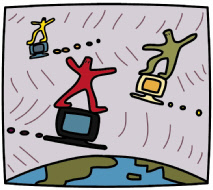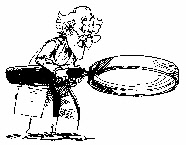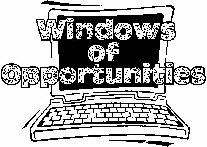

Make a point of visiting us weekly!

Return to Becoming a Learner CONTENTS PAGE
Page 16: And so .... Lifetime Learning
Part 2: The Adventure of Learning
Observing some lives
Jay has followed a traditional educational path – GCSE’s, ‘A’ Levels, and a degree – and she’s got a job! She breathes a sigh of relief, no more learning. Six months into her new job her boss sends her on a day course to improve her knowledge of the business. The same thing happens two years later. A year later she is sent on a management course and a month later is promoted to manager level. A year later she’s sent on a Course to understand new legislation that has recently come out that affects their business.
A year later her boss approaches her with the suggestion that they would like to promote her to the training branch so she will start training others in the Company. She is sent on a week’s course about training others. Two years later she is head-hunted by another Company who want her to train up their marketing people. She’s sent away on a three day course to begin understanding marketing. How many courses has she been on so far since leaving Uni?
Jay has followed a traditional educational path – GCSE’s, ‘A’ Levels, and a degree – and she’s got a job! She breathes a sigh of relief, no more learning. Six months into her new job her boss sends her on a day course to improve her knowledge of the business. The same thing happens two years later. A year later she is sent on a management course and a month later is promoted to manager level. A year later she’s sent on a Course to understand new legislation that has recently come out that affects their business.
A year later her boss approaches her with the suggestion that they would like to promote her to the training branch so she will start training others in the Company. She is sent on a week’s course about training others. Two years later she is head-

Kim enjoyed a course on pottery that she took at an evening class. She bought a kiln and a potter’s wheel and in her spare time developed her skills. A friend offered to sell the things she made in their farm shop. She went on a day’s course on special glazing techniques, and as a result started producing a wider variety of very attractive items. Her friend suggested she had a word with someone she knew with a shop in town, and as a result was invited to provide a regular supply for that shop. She gave up her other job in the office she worked in and devoted her time to making ceramics. After a while as demand grew, she realised she would need to take on someone to help her.
Production stepped up and she realised that she lacked knowledge and skills to run a business and so joined a ten week, once a week, course on basic business skills. As the business boomed she eventually employed three other staff. When she employed a business mentor he suggested she would do well to take a course on handling personnel.
Travelling to Trade Fairs and seeing other people’s work, she realised there were other areas that she could diversify into, and so over the next year, she and one other member of the staff went on several courses for developing entirely new forms of pottery and ceramics.
She insisted she would maintain a hands-on outlook in the business as she still had a flair for creating new pieces. With every new development came a new need for training.
Travelling to Trade Fairs and seeing other people’s work, she realised there were other areas that she could diversify into, and so over the next year, she and one other member of the staff went on several courses for developing entirely new forms of pottery and ceramics.
She insisted she would maintain a hands-

Lee left school with a handful of NVQ’s and joined a small local manufacturing firm. After a while his boss, observing some potential in Lee, offered to put him on the equivalent of an apprenticeship. Five years later, a qualified worker in the manufacturing business, his boss sent him on a two day course to specialise in one particular aspect of the business. Two years later he was appointed supervisor and was sent on a basic course for overseeing others and maintaining standards in manufacturing.
Two years later, after a further course, he was transferred into the quality management division of the company which had grown considerably since he first joined it. Immediately he was sent on a Quality Management Course for a week. Over the next three years, he was sent on three courses.
Unfortunately the firm over extended and got into financial difficulties and with the pressure of competition of cheap imports, the company was eventually put into liquidation. A friend in a local college suggested to Lee that he move into Further or Higher Education. After six months of unsuccessfully looking for new jobs, a job at the local college came up and he was accepted. Lee now found himself being sent on a teacher-training course and then on a variety of courses developing his knowledge in the wider area in which he was now teaching.
Unfortunately the firm over extended and got into financial difficulties and with the pressure of competition of cheap imports, the company was eventually put into liquidation. A friend in a local college suggested to Lee that he move into Further or Higher Education. After six months of unsuccessfully looking for new jobs, a job at the local college came up and he was accepted. Lee now found himself being sent on a teacher-

When Lee eventually retired he decided to return to his roots and enrolled on a couple of Adult Education Courses, one for welding and the other for brazing. With the time he now had available to him in retirement, he developed architectural sculpture in metalwork as a hobby. A whole new area of learning opened up.
And so... lifetime learning?
As we have demonstrated with the three people above, learning does not stop at twenty. We live in a world of knowledge, of information, of ability-improvement, of skill-development and, for an increasing number of people, changes through learning in the world of work, is the norm.
We used to think that the years between say 5 and 18 were the all-important years for learning, done through school and college and then, for some, University. It is so common, that it no longer raises a smile to say, “Change is here to stay.” It is!
Yes, there may be many of us for whom training for advancement is just a dream, but for large numbers that is what working life is all about. Annual assessments now regularly include, “What training would help you now?” and the expectation is that you will not stand still. This is the world of lifelong or lifetime learning.
As we have demonstrated with the three people above, learning does not stop at twenty. We live in a world of knowledge, of information, of ability-
We used to think that the years between say 5 and 18 were the all-
Yes, there may be many of us for whom training for advancement is just a dream, but for large numbers that is what working life is all about. Annual assessments now regularly include, “What training would help you now?” and the expectation is that you will not stand still. This is the world of lifelong or lifetime learning.

Right at the beginning of this ‘Course’ we asked the question, “Why Learn” and gave the simple riposte, “Why not?” On this page we have developed that to suggest that for many the answer is or will be, “Because I have to.”
For others of us (and hopefully something we’ve said over the pages here may have stirred this into being) there may simply be an inquisitiveness that replies to the question, “Why Learn”, with the simple response, “Because I want to.”
Learning, we said right back at the beginning, is all about an attitude. For large numbers of us, in the earlier years of our lives, ‘education’ means imposed learning and it was not a particularly enjoyable experience. But we grew up and after the pressure to learn fell away, we found desires to do things that required us to acquire new knowledge or new skills.
For others of us (and hopefully something we’ve said over the pages here may have stirred this into being) there may simply be an inquisitiveness that replies to the question, “Why Learn”, with the simple response, “Because I want to.”
Learning, we said right back at the beginning, is all about an attitude. For large numbers of us, in the earlier years of our lives, ‘education’ means imposed learning and it was not a particularly enjoyable experience. But we grew up and after the pressure to learn fell away, we found desires to do things that required us to acquire new knowledge or new skills.

It doesn’t have to be under the pressure of a ‘course’; it can be the gradual development that we bring to ourselves by talking the opportunities that arise, or the information that becomes available. It really is amazing today, the range of things that are ‘out there’ that are available to us. It’s a new day, a new world, a world so very different from that which our grand-parents and even our parents knew.
The fact that you are here on the Internet says it’s like you are sitting on a beach and as you look inland you wonder what is there. And if you want to start thinking bigger, imagine this ‘beach’ (an analogy for learning on the Internet where you are at the moment) is where you have drifted to almost by accident and lo, you find out it is called the Atlantic coast of North America. Do you catch the scale? You are at the same place that the Pilgrim Fathers found themselves, except for them it was a physical land and for you it’s a virtual land, called the land of learning.
The fact that you are here on the Internet says it’s like you are sitting on a beach and as you look inland you wonder what is there. And if you want to start thinking bigger, imagine this ‘beach’ (an analogy for learning on the Internet where you are at the moment) is where you have drifted to almost by accident and lo, you find out it is called the Atlantic coast of North America. Do you catch the scale? You are at the same place that the Pilgrim Fathers found themselves, except for them it was a physical land and for you it’s a virtual land, called the land of learning.

One final thought. You will stay on this ‘beach’ with which you are familiar and not move on inland if you listen to the lies that say, “You’re stuck here, you’re not a learner, you can’t go any further, why bother, who cares.” Yes, you could still be here in the same place in thirty years’ time, bored by the sand.
This is supposed to be a starting point, not a staying point. If you’ve read the pages and do nothing about it, you’ll have missed the point.
What are we going to learn next?
This is supposed to be a starting point, not a staying point. If you’ve read the pages and do nothing about it, you’ll have missed the point.
What are we going to learn next?
